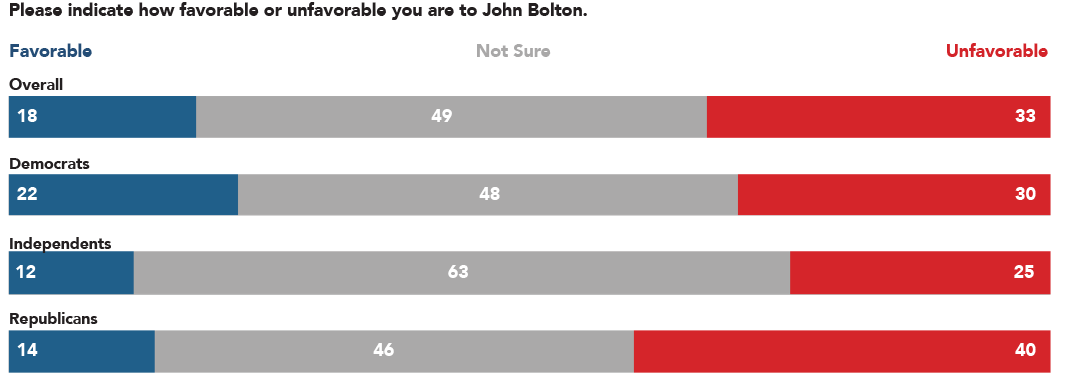Every month, we pick a few topics for exploration. The topics we select aren’t meant to cover every issue area facing the progressive community, but rather to give actionable advice on how to talk about key issue areas. This month we focused on:
The Affordable Care Act turns 10: How can progressives speak to Americans’ biggest concerns about health care today?
Health care remains an important issue for Americans with costs being the biggest concern. On the 10-year anniversary of the ACA, progressives can focus on elements of the law that tackle costs and provide patient protections.
Americans oppose cuts to Social Security and Medicare, but do they know the Trump administration has proposed them?
Most Americans say they would never approve of an elected official who backed cuts to Medicare and Social Security. But many appear unclear about Donald Trump’s position on the issue.
The impeachment proceedings against Donald Trump have come to a close. How should progressives talk about the legacy of this historic moment?
Many Americans approve of Senate Democrats’ decision to vote in favor of impeachment, while a majority continue to believe Trump has committed crimes during his term in office.
The State of American Health Care
Health care remains an important issue across the board for Americans. Above all, costs are the biggest concern.
By wide margins, Americans continue to prefer Democrats in Congress to President Trump when it comes to health care issues. However, concerns loom over the president when it comes to the issue of health care. In a head-to-head comparison, 50% of Americans say they trust Democrats in Congress more to handle health care, as opposed to 36% who trust Trump more. Democrats in Congress are also trusted more to protect health care coverage for people with pre-existing conditions (55% Democrats to 31% Trump), to improve the quality of health care (52% to 34%), and to improve access to affordable long-term care (50% to 34%). Overall, President Trump earns a job performance rating of 45% approve to 53% disapprove in this month’s survey – the highest approval rating for the president in Navigator’s tracking since 2018.
The number one concern when it comes to health care in America today: cost.
In rating the overall quality of care received, 55% rate it positively (15% say it’s excellent, 40% say it’s good), while only 41% rate it negatively. However, one component of health care remains a pain point: when asked to rate the availability and affordability of health care in the United States today, the share giving a positive rating drops to 44%, and the majority (51%) feel negatively.
The importance of costs becomes especially clear when asking Americans what they personally worry about. On this question, the top five responses revolve around affordability. At the very top: the cost of prescription drugs (47%), the cost of out-of-pocket expenses (42%), and being unable to afford an emergency medical expense (37%). Concerns about costs extend across party lines, with 48% of Democrats, 42% of independents, and 48% of Republicans worried about prescription drug prices. When asked which issues they have actually struggled with over the past 12 months – a higher bar than “worry” – the same issues rise to the top again.
Progressives making their case on health care should remember: while there are many ways to approach improvements to the health care system, Americans’ biggest challenges are costs, costs, and costs.
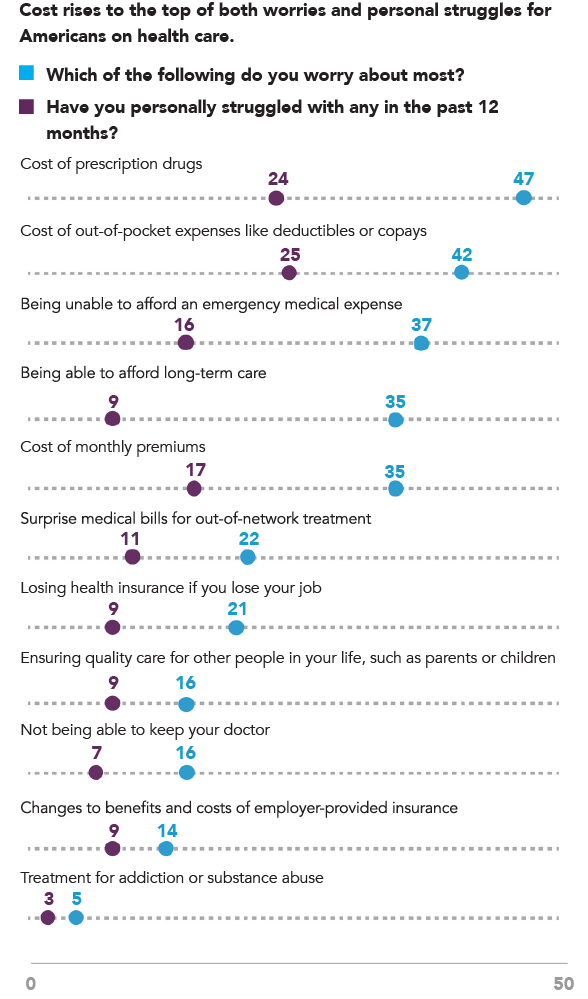
From personal to political: Americans want leaders in Washington to focus on reducing costs, but pre-existing conditions protections remain important too.
Navigator also asked respondents to identify which goals leaders in Washington should consider in changing the health care system. Once again, the dominant theme was cost, including lowering the cost of prescription drugs (57%), reducing out-of-pocket costs (49%), and others. Beyond cost, coverage for pre-existing conditions also remains a top concern for Americans (46%).
When asked to rate the importance of that same list of policy priorities for respondents’ personal health care situations, those related to cost rose to the top, including reducing out-of-pocket costs (52%), lowering the cost of prescription drugs (50%), and reducing premiums and deductibles (49%).
The “Affordable Care Act” is rising in favorability.
The “Affordable Care Act” has a net +23 favorability rating (54% favorable-31% unfavorable), which represents a 22-point increase since last tested in June 2019 (46%-45%). However, when described instead as “Obamacare,” while still favorable, net favorability drops to +5 (48%-43%). The gap between the two framings is especially large among independents (+21 for “Affordable Care Act” and -9 for “Obamacare”) and Republicans (-40 and -72).
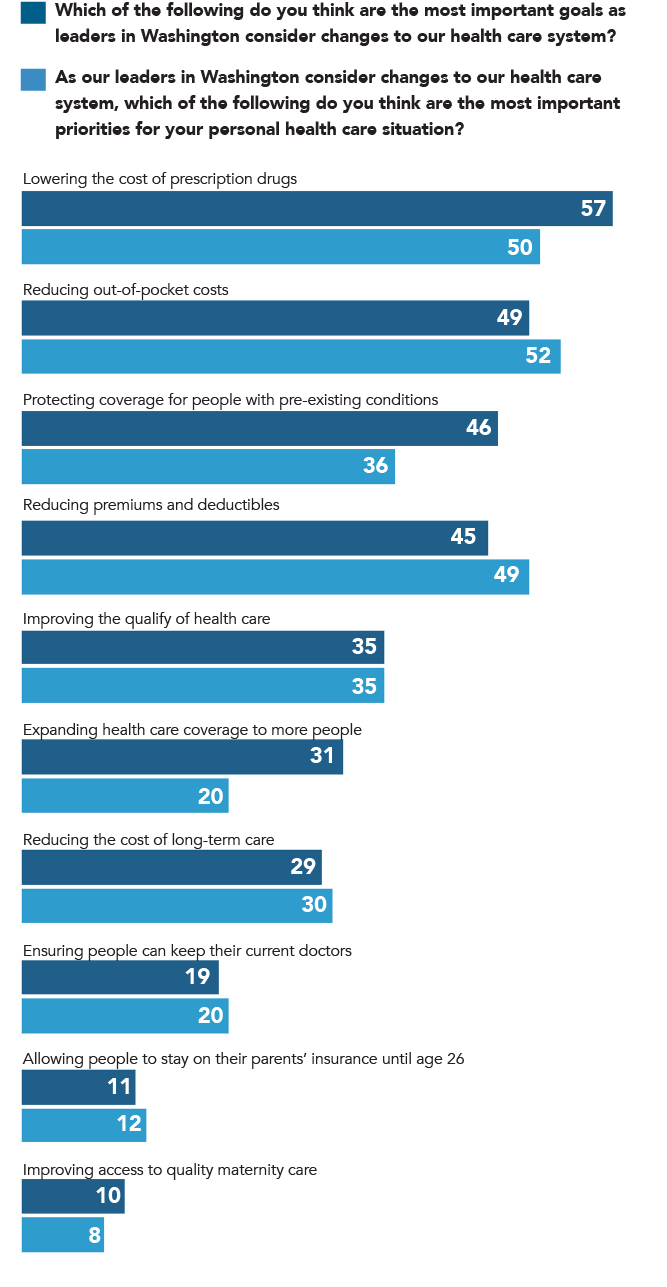
The Affordable Care Act Turns 10
The ACA at 10 years: Americans are especially glad for the parts of the health care law that prevent abuse by insurance companies and protect patients.
Ten years on, the Affordable Care Act is popular.
The ACA was first signed into law March 23, 2010, a milestone in the history of the American health care system that extended coverage to more than 20 million Americans. In the years since its passage, conservatives have tried to undermine the program, voting at least 70 times to repeal it. But the Affordable Care Act is more popular than ever, with a majority (54%) rating it favorably, while only a third (31%) rate it unfavorably (Navigator’s findings are similar to those released last week by Kaiser Family Foundation, showing the ACA at 55% favorable to 37% unfavorable, the law’s all-time best rating in their tracking).
Progressives should focus in particular on the Affordable Care Act’s protections for people with pre-existing conditions and protections against insurance companies.
In advance of the ACA’s 10-year anniversary, Navigator tested nine key elements of the law to determine how their broad favorability is, as well as how much each has been helpful to Americans and their families. With all nine, majorities viewed each part of the law favorably and found each to be personally helpful. In fact, each element was more popular than the law as a whole. Among the most popular elements were coverage for pre-existing conditions (62% very favorable); the requirement for insurance to cover prescription drugs, mammograms, and dental care for children (57%); and the elimination of lifetime limits on coverage for patients who get sick (56%).
What may be driving the popularity of the law is the large number of Americans who say the law has been directly helpful for themselves and their families. A majority (at least 59%) of Americans report that each element tested has been “very” or “somewhat” helpful to them or their family, including again: coverage for pre-existing conditions (49% very helpful); coverage of certain things like prescription drugs, mammograms, and dental care for children (47%); and elimination of lifetime limits on coverage for patients who get sick (41%).
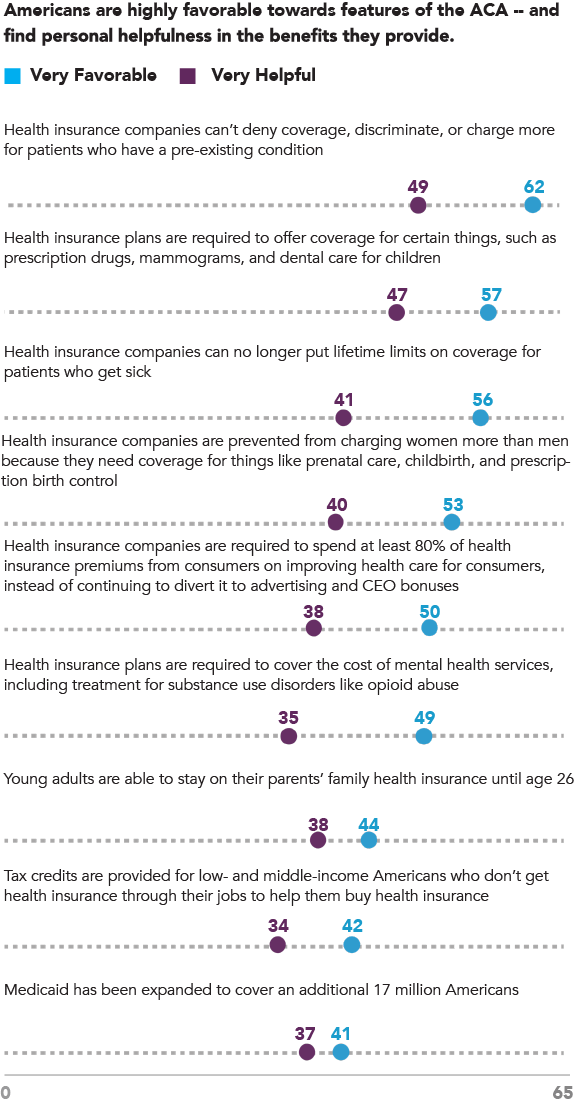
Protecting Medicare and Social Security
Cutting Medicare and Social Security is a major concern – even a “deal breaker” – for most Americans. But many are not very familiar with the Trump administration’s position on the issue.
A vast majority of Americans are favorable towards Social Security and Medicare, with 83% favorable towards Social Security (49% very favorable) and 80% favorable towards Medicare (48% very favorable). And yet, when asked how well they understand Trump and his administration’s position on Social Security and Medicare, only 30% of Americans say they know “very well” what President Trump’s position is on the issue. In contrast, 51% feel like they know his position on immigration very well. In other words, progressives have a window to shape the conversation around Trump’s approach to Medicare and Social Security by highlighting efforts to cut these very popular programs.
Cutting Medicare and Social Security is a dealbreaker for many Americans.
Navigator asked respondents to indicate whether they found a series of policy positions to be “deal-breakers” for approving of an elected official. The biggest deal-breaker position was supporting cuts to Social Security and Medicare, with 50% rating it as a deal-breaker, including 66% of Democrats and 50% of independents. Another 29% of Americans say this position would cause “major concerns.”
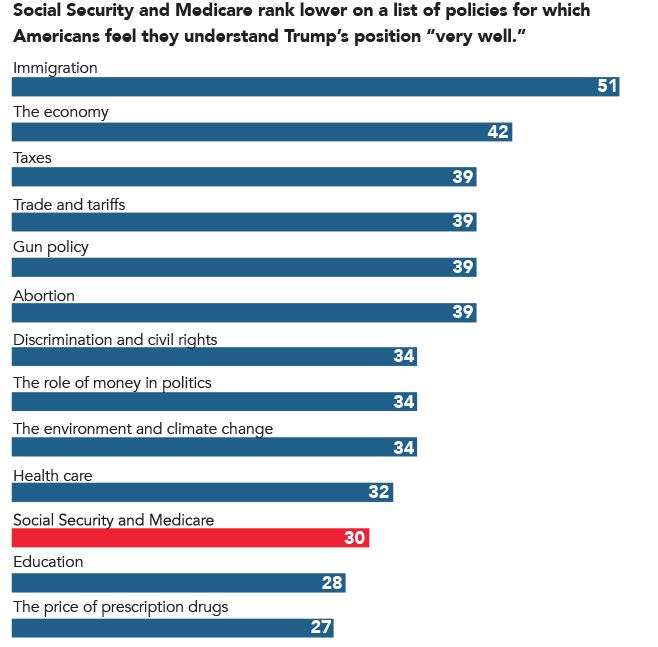
The Trump administration’s budget proposal is a recent example.
While the president has tweeted that he doesn’t plan to cut Medicare and Social Security, his actions speak louder. Navigator tested three specific ways to make the case that Trump was trying to cut Social Security and Medicare: quoting Senate Majority Leader Mitch McConnell making these intentions clear; quoting President Trump’s recent comments at the economic summit in Davos, Switzerland where he said such cuts would on the table in a second term; and another citing specific cuts included in the latest Trump administration budget. By a clear margin, Americans say the last item – the proposed budget cuts – provides the strongest evidence that President Trump would pursue efforts to Medicare and Social Security.
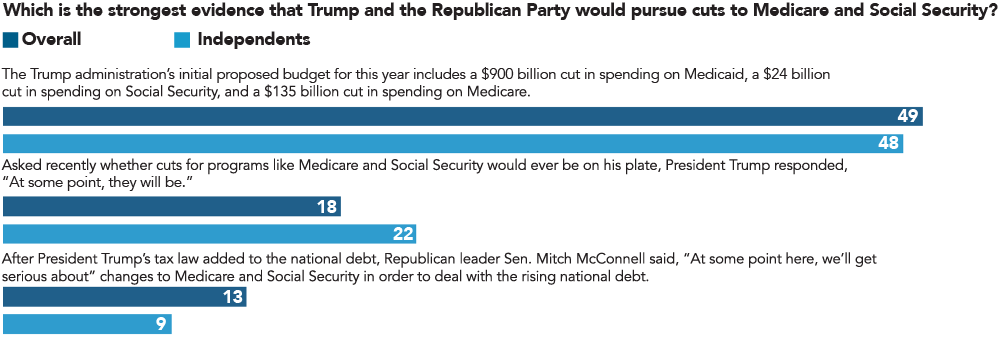
A Look Back at Impeachment
Even many Americans not sold on impeachment are favorable to Senators who voted for it.
While opinion on impeachment is evenly split, the majority of Americans still believe that Trump has committed a crime while president (55% believe he has and 38% believe he hasn’t). On impeachment alone, forty-seven percent (47%) of Americans approve of the House passing articles of impeachment while 45% disapprove, and 47% of Americans likewise disapprove of his acquittal by the Senate compared to 45% who approve.
Despite divisions on impeachment, Americans approve of Senate Democrats’ decision to vote in favor of conviction.
- Presented with a short description of Trump’s alleged misconduct alongside a note that many Republicans called Trump’s behavior “inappropriate,” “wrong,” or “not ‘perfect’,” Americans approve of Democrats voting in favor of impeachment by 51% to 40%.
- Yet when presented with a quote from Senator Mitt Romney justifying his vote to convict the President, a larger share of Americans (54%) characterize themselves as supportive of Romney’s decision, while only 37% are opposed. The margin is significant among independents (49% support to 27% opposed) and white Americans with a college degree (59% to 34%).
- When asked who specifically they trust more on matters of impeachment – Mitt Romney or President Trump – Americans trust Romney more by an 8-point margin (45% to 37%).
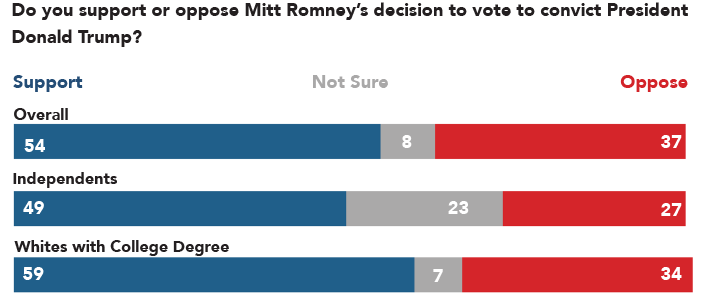
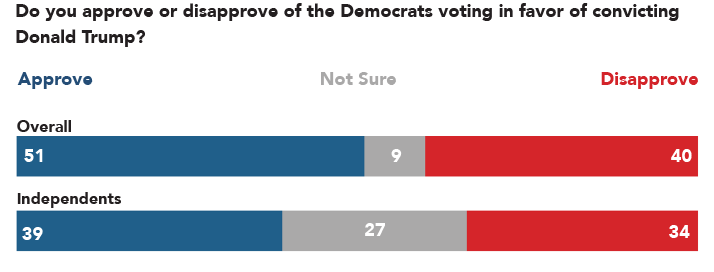
A Case Study on “Abuse of Power”
Past Navigator research has shown Lieutenant Colonel Alexander Vindman to be one of the strongest witnesses to appear in the House’s impeachment inquiry (65% of respondents in December found his testimony concerning). After describing Vindman and his brother’s early firings from their roles on the National Security Council, 49% of Americans describe these firings as an “abuse of power” (including 45% of independents), while 35% did not (and only 22% of independents). Moreover, an additional 12% of Americans say the firings were “inappropriate” if not an abuse of power.
Bonus Points
Democrats in Congress are more trusted to handle election security at a time when Americans are concerned about the possibility of foreign interference in the 2020 election.
- When asked if they trust Democrats in Congress or President Trump more to handle “preventing foreign interference in U.S. elections,” 46% of Americans choose Democrats and only 36% choose Trump, including a net of +15 for trust in Democrats among independents (37% Democrats in Congress, 22% Trump).
- A vast majority (82% of Americans) find the intentional spread of disinformation about presidential candidates on social media concerning, including 48% who find it “very concerning.”
John Bolton suffers from negative sentiment across partisan identities, in line with previous Navigator findings on support for him testifying in the Senate impeachment trial.
- When asked to rate the favorability of former National Security Advisor John Bolton in the most recent Navigator survey, Americans gave him a net -15, with only 18% favorable towards him and 33% unfavorable. Bolton’s unpopularity extends across party lines, with Democrats giving him a net -18, independents a net -13 , and Republicans a net -26.
- However, by a margin of 48% to 28%, Americans support calling Bolton to testify about his knowledge of Trump’s misconduct, even though the impeachment trial is over. In January, 82% believed it to be important that John Bolton testify in the Senate impeachment trial (56% said it was very important).
